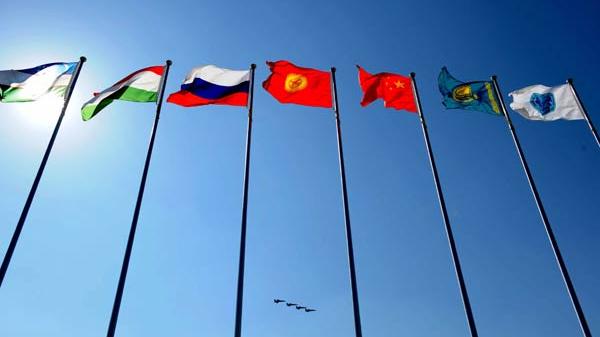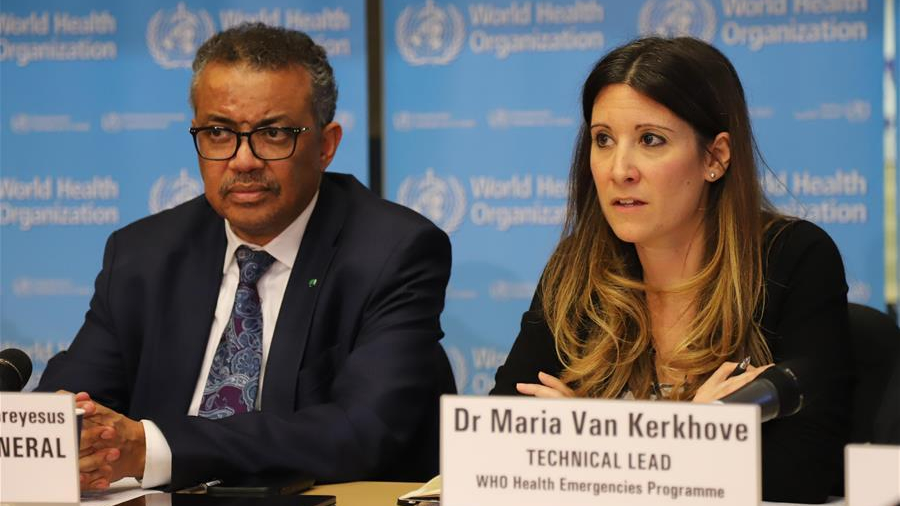我院特聘教授、吉尔吉斯共和国前总理卓奥马尔特·奥托尔巴耶夫 (Djoomart Otorbaev) 3月26日在CGTN网上发表英文文章,以下是经翻译后的中文版内容。

2014年8月29日,在中国内蒙古朱日河举行的“和平使命-2014”军事演习闭幕式上,飞机飞过上海合作组织成员国的国旗。/新华社
在过去的几天中,新型冠状病毒肺炎大流行的情况变得更加严重。总病例数和死亡人数呈现指数增长。世界各地的人们都非常关注疫情,企业也陷入恐慌。全人类或许要面临一个不容乐观的情况。
我们现在注意到的是数十个国家应对疫情各自为政而互不协调。大多数行动看起来很混乱,也没有达到预期效果。比较不同国家的早期应对(例如中国和意大利),我认为很明显只有协调一致的国际合作才能防止最坏的情况出现。
但是实事求是地讲,从我们今天观察到的情况来看,全球采取协调一致的措施来应对疫情大流行的可能性极低。许多政策制定者还没有想好如何与我们共同的敌人展开坚决的斗争,反而在口水战、相互指责等方面浪费精力。我强烈建议可以尝试在地区层面开展合作。
截至目前,中国是世界上唯一一个把大规模新型冠状病毒肺炎疫情控制住了的国家。现在中国想帮助其他国家阻止这种病毒。但是中国如何同时为150多个国家和地区提供帮助呢?
迈向全球合作的第一步可能是中国首先开始与邻国进行合作,特别是可以与上海合作组织(SCO)成员国一起抗击疫情。
上合组织由中国、俄罗斯、哈萨克斯坦、巴基斯坦、印度、吉尔吉斯斯坦、塔吉克斯坦和乌兹别克斯坦组成,成员国总人口约为32亿,占世界人口的44%。上合组织的多边结构最开始以三个层面的合作为主要支柱:1、在政治和安全方面的合作;2、在贸易和经济方面的合作;3、在文化和人道主义方面的合作。
上合组织成员国在2月14日的声明中对中国政府和中国人民为遏制新型冠状病毒肺炎疫情所采取的坚决措施表示欢迎。上合组织秘书长弗拉基米尔·诺罗夫也对中国为遏制疫情所采取的措施表示赞赏。
习近平主席在与俄罗斯总统弗拉基米尔·普京和与其他一些国家元首的电话中表示,中国愿意与俄罗斯和其他国家共同努力维护全球公共卫生安全。
我们必须承认:只有多边合作才能最终打败这个致命的病毒。在全人类处于这样的关键时刻,对选择狭隘民族主义还是构建国际伙伴关系不应有任何犹豫。
紧急行动计划必须包括应对健康威胁和经济挑战这两个基础。为了恢复民众的信心,上合组织需要通过一项具体的行动计划,指明处理紧急卫生事件和加强区域经济活动方面的协调做法。
上合组织的所有成员作为发展中国家,在获得医疗器械设备方面面临着重大挑战。相互合作中的基本要素可以是分享常规和特殊做法,尤其要重视相关知识的积累。
当务之急应该是建立一个特别的基金来购买必需的设备、药品和消耗品。

2020年3月3日,世界卫生组织突发卫生事件计划技术负责人(右)与世卫组织总干事在瑞士日内瓦举行的每日简报会上。 /新华社
上合组织作为一个多边机构还可以邀请世卫组织参加其视频会议。上合组织以后也可给予世卫组织临时席位或特别地位,成为常设观察员。
上合组织还可以为本地区制定协调一致的财政刺激措施,以确保货币和金融体系有足够的流动性。因此,可能需要及时形成一套基于宏观经济措施的具体行动方案,也许需要亚洲基础设施投资银行等发展机构的协助。
上合组织应对疫情的第一步还应包括尽快召开领导人之间的电话会议。
上合组织有独特的机会向世界展示其在当前危机中的效率以及多边主义的巨大潜力。这是一个机会,可以先在一个小型命运共同体中实践区域合作,然后扩展到全球合作。
各国必须团结一致采取有效措施,当机立断以击败共同的敌人。理想情况下,各国甚至可以为预防下一次危机(不一定与卫生事件有关)创造条件。
人民的生命危在旦夕。如果上合组织在这次与疫情的斗争中再次展现效率,它将对潜在成员国更具吸引力。
(廖舟译)
卓奥玛尔特·奥托尔巴耶夫(Djoomart Otorbaev)3月26日在CGTN发表的英文原文如下:
Petty nationalism or intl. cooperation? SCO may set an example
By Djoomart Otorbaev
Editor's note: Djoomart Otorbaev is the former prime minister of the Kyrgyz Republic, a distinguished professor of the Belt and Road School of Beijing Normal University, and a member of Nizami Ganjavi International Center. The article reflects the author's views, and not necessarily those of CGTN.
During the last few days, the pandemic situation has become much worse. The total cases and death toll demonstrate the exponential growth. People around the world are deeply concerned and businesses are in panic. A truly horrific scenario might be in front of all humanity.
What we observe now are dozens of uncoordinated "national" reactions to the pandemic. Most actions look chaotic and are not functioning as they should. Comparing the early responses of different nations – take China and Italy, for example – to me, it is clear that only coordinated international efforts can prevent the worst-case scenarios.
However let's be honest with ourselves. Judging by what we see today, a coordinated global response to the pandemic is highly unlikely. Instead of deciding how to resolutely fight the common enemy, many "policymakers" are wasting their energy in a war of words, blame games, etc. My strong suggestion would be to start to work together on regional levels.
As of now, China is the only country in the world which has brought a large-scale COVID-19 pandemic under control. Now China wants to help other countries stop the virus. But how can they assist 150+ countries at the same time?
As the first step toward global coordination, China should start working with its neighbors. Namely, it should start fighting the pandemic along with its partners from the Shanghai Cooperation Organization (SCO).
Constituted by China, India, Kazakhstan, Kyrgyzstan, Russia, Pakistan, Tajikistan and Uzbekistan, the SCO possess a total population of 3.2 billion, accounting for 44 percent of the world population. The SCO was originally conceived as a multilateral structure with three levels of cooperation serving as its primary pillars. These include cooperation (a) in politics and security, (b) in trade and economic activity, and (c) in the development of cultural and humanitarian ties.
In its statement on February 14, the SCO member states welcomed the resolute measures being undertaken by China's government and people to fight the epidemic. Secretary-General of the SCO Vladimir Norov has praised the measures being taken in China to clamp down on the coronavirus.
Days later, President Xi Jinping said that China was prepared to "work with all other countries" to intensify the global fight against the coronavirus pandemic. Xi made his comments in a late-night telephone call with the Russian President Vladimir Putin, expressing China's willingness to make concerted efforts with Russia and other countries to safeguard global public health security.
Let me repeat it again – only a multilateral onslaught will be able to defeat the deadly virus. In this critical time for all humanity, there shouldn't be any slight hesitation of choice between petty nationalism and international partnership.
Two pillars must serve as the foundation of an urgent action plan – fighting health threats and economic challenges. To restore the confidence of the people, the SCO needs to adopt a specific action plan to address joint steps on medical emergencies and support of regional economic activity.
As developing countries, all SCO members have significant challenges in terms of access to healthcare facilities. Fundamental elements of cooperation could be sharing general and specific practices, but especially accumulated knowledge.
Organizing and structuring a special financial fund to purchase necessary equipment, medicine and consumables should be the first priority.
As a multilateral organization, the SCO could also invite the World Health Organization (WHO) to their first virtual meetings. The SCO could later grant the WHO a temporary seat or special status as a permanent observer.
The SCO could also establish coordinated fiscal stimulus to the region to ensure sufficient liquidity in the monetary and financial systems. Thus, a timely establishment of a specific action plan on macroeconomic measures, perhaps with contribution from development institutions like the Asian Infrastructure Investment Bank (AIIB), would be required.
The SCO's first step to tackle the pandemic should involve a teleconference between its leaders as soon as possible.
The SCO has a unique chance to show to the world its efficiency during the current crisis, and moreover, to demonstrate the great potential of multilateralism. Here is the chance to start practicing the regional and, after that, the global cooperation of our world of a small community of common destiny.
Using efficient steps, the nations must get together and set a straightforward course to defeat the common enemy. Ideally, the nations may even establish the conditions to prevent the next (not necessarily health-related) crises.
The lives of the people hang in the balance. The SCO would become even more attractive to other potential members if, again, it will prove its efficiency – this time in its fight with COVID-19.